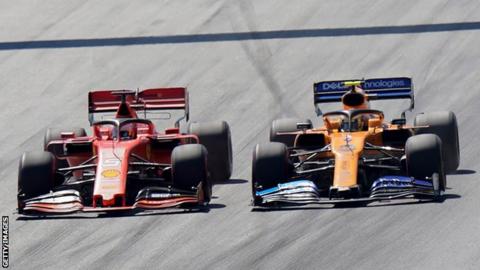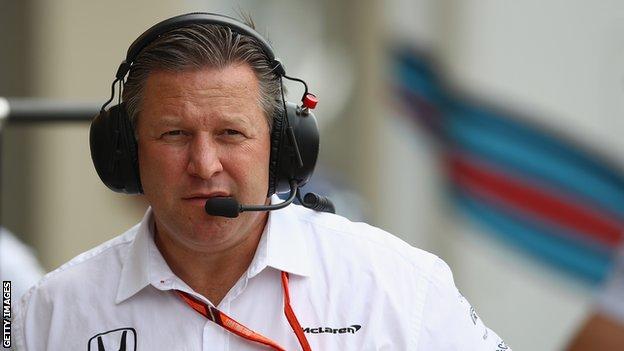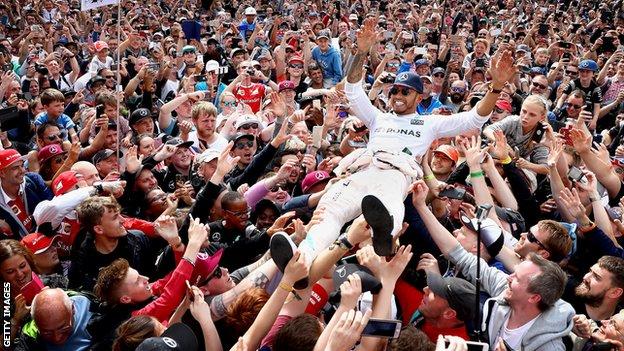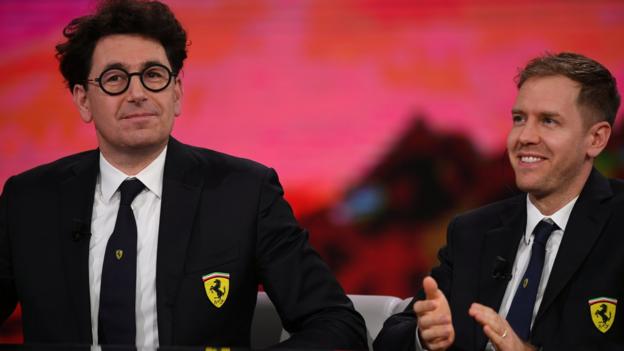
McLaren say Ferrari are “living in denial” over their opposition to plans to lower Formula 1’s budget cap.
McLaren Racing chief executive Zak Brown rejected claims by Ferrari team principal Mattia Binotto that F1 should not “react in a hurry” to the coronavirus crisis.
“I’m almost at a loss as to what to say to that,” Brown said.
“We are going through the biggest crisis the world has seen. You have countries and industries shut down.”
He added: “To not hurry to address what is going on is a critical mistake.”
What is the row about?
F1 bosses are in the middle of intense negotiations over the level at which to set the spending restriction for teams when it comes into force in 2021.
A cap of $175m (£137.9m) was agreed last October and is in the rules, but teams have already agreed informally to lower that figure to $150m in 2021 and are now debating whether to reduce it further.
McLaren say they would be happy with a cap of $100m, pointing out that there are a number of major exemptions to the cap, such as driver and top executive salaries and engine costs that push it many millions higher.
But Ferrari have so far opposed any move to go lower, claiming it would dumb the sport down and cause it to lay off too many staff, which is especially complicated for them because of Italian employment law.
Ferrari have, though, sought to clarify comments from Binotto, in an interview with the Guardian, saying they had been misinterpreted and emphasising that he was not threatening to pull the team out of F1 if a lower cap was imposed.
“He never mentioned Scuderia Ferrari quitting F1,” Ferrari said. “On the contrary, he said that we would not want to be put in a position of having to look at further options, besides continuing racing in F1, for deploying our racing DNA, in case the budget cap would be even more drastically reduced, putting at risk hundreds of workplaces.”

‘F1 is at extreme risk’
Brown said that claiming F1 could take its time over the talks was “a very poor leadership strategy”.
And he repeated warnings made in a BBC Sport interview earlier this month that the sport was threatened by the coronavirus pandemic.
“If F1 goes by its old habits we are all at extreme risk for the future of F1,” he said. “But if we think forward and get with the times, we cannot only survive what’s going on right now but the sport can thrive and we all win.
“I am all for a good healthy debate, but the comments I’ve seen being put forward don’t stack up, contradict themselves and don’t accurately reflect what I think is reality.”
Brown rejected Binotto’s arguments that F1 would be devalued with a lower budget cap, saying $100m or $125m with all the exemptions was still “a tremendous amount of money” and would more than allow it to remain the technological pinnacle of motorsport.
A major financial development
F1 has been thrown into disarray by the coronavirus crisis, with eight of the first nine races postponed – with the Monaco Grand Prix cancelled -and has made a series of cost-cutting moves to try to put itself in a strengthened position.
The lack of grands prix is a significant threat to the sport and its teams because race-hosting fees and television broadcast rights are its two biggest income streams.
Brown’s comments come against the backdrop of two significant financial developments from the sport’s owner, the US group Liberty Media.
It announced on Thursday that it had taken a series of complex measures that have given F1 much greater liquidity to ride out the difficult economic conditions, including paying the F1 Group $1.4bn.
Liberty president and chief executive officer Greg Maffei added that some teams had been given advances on their prize money payments.
“We want to make sure that teams are solvent because they are part of what we need to race successfully in 2020, 2021, and beyond,” Maffei said.
Brown said McLaren were not one of the teams to receive an advance, but added: “It only demonstrates the dire need the sport finds itself in. I’m glad they have stepped in and helped teams; anyone who is borrowing money is buying some time.”

Plans to restart the season
F1 is trying to work out how it can start the season and plans centre on two races in Austria on consecutive weekends at the start of July followed by two at Silverstone, then a handful more European races before heading off around the world.
The season would start with races behind closed doors.
Brown said: “Sport has always been a great healer and I think the appetite for F1, closed doors or not, and sport in general will be awesome.
“But if we end up having no F1 this year, the financial consequences for F1 and the teams would be devastating, just as it would be for any industry shut down for a year and then we would need an additional rethink or solution.
“Your guess is as good as mine as to are we going to go racing.
“The plan Chase has shared with us is a work in progress but it seems a very sensible plan.
“Going racing without spectators, certainly in the short term, is realistic. If we thought we were going to go to Austria or the British Grand Prix with 100,000 people that would be naive. He has been speaking with the various governments, so I am pretty optimistic.
“The prize fund that is shared between the teams is about $1bn. That is a massive amount of money that we are all depending on and if it went away or was drastically reduced, we would all have to find solutions to the lack of resources.”
